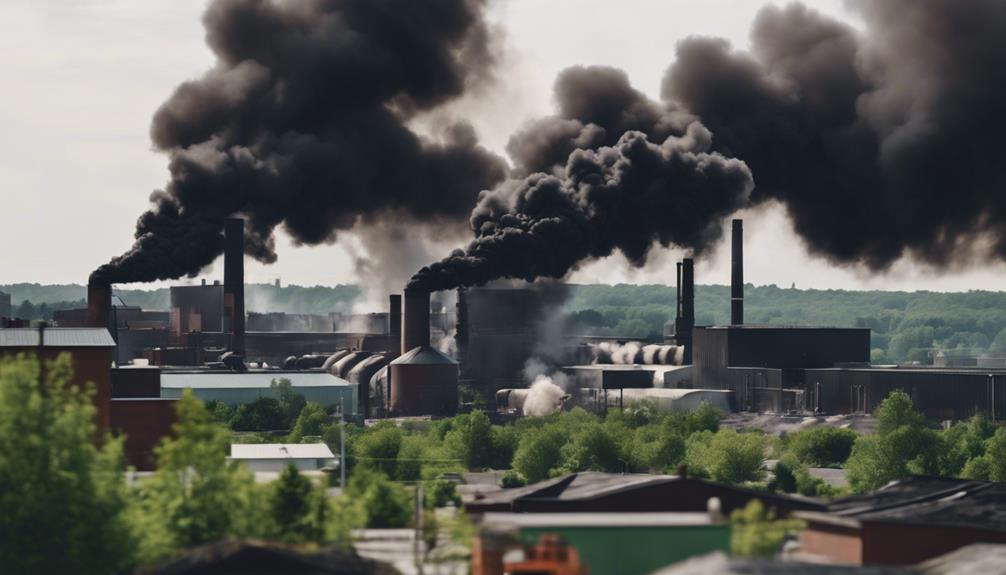What Is the Environmental Impact of Asphalt Shingles?
Get ready to uncover the hidden complexities and far-reaching consequences of asphalt shingles' environmental impact - the story goes deeper than you think.
Asphalt shingles contribute to environmental issues from raw material extraction to disposal. The construction industry faces sustainability challenges, highlighting the need to scrutinize these common roofing materials. This requires balancing convenience, cost, and ecological integrity, urging innovation and change in how we use asphalt shingles.
From sourcing raw materials to disposing of old shingles, the environmental impact is significant. This situation calls for a deeper look at our duty to support a more sustainable future. Balancing convenience, cost, and environmental health pushes us to consider new ways to handle asphalt shingles.
How Does Asphalt Shingle Production Impact the Environment?
The production of asphalt shingles has a notable environmental impact, especially when it comes to resource use and emissions. These shingles are mainly made from bitumen, fibreglass, and mineral granules. Extracting and processing bitumen, which is derived from petroleum, consumes a lot of energy and releases substantial greenhouse gases.
Producing fiberglass also demands high energy and emits volatile organic compounds (VOCs). Additionally, the raw materials for the mineral granules, like limestone and silica, need to be mined, which can destroy habitats and pollute water sources.
Moreover, the transportation of raw materials to manufacturing facilities and the distribution of asphalt shingles to construction sites contribute to carbon emissions and air pollution. The overall environmental footprint of asphalt shingle production is substantial due to the energy-intensive processes, resource extraction, and emissions associated with each stage of manufacturing.
What are the Available Recycling Options for Used Shingles?
Recycling options for used asphalt shingles play a significant role in mitigating the environmental impact of their disposal and contribute to a more sustainable waste management strategy. When considering recycling used shingles, several options are available:
- Shingle Recycling Centers: These centers specialize in processing old asphalt shingles, and separating the materials for recycling purposes, such as using the asphalt for paving roads.
- Manufacturer Take-Back Programs: Some asphalt shingle manufacturers offer take-back programs where they collect used shingles to recycle them into new products, reducing the need for virgin materials.
- Local Transfer Stations: Many waste transfer stations accept used asphalt shingles for recycling, ensuring they are diverted from landfills and put to new use.
- Contractor Recycling Services: Roofing contractors may partner with recycling facilities to make sure that removed shingles are properly recycled, promoting a more sustainable approach to roof replacement projects.
How Effective Are Sustainable Practices in the Manufacturing Processes of Asphalt Shingles?

Incorporating sustainable practices in the production of asphalt shingles is vital for cutting down environmental impact and promoting a greener industry. This means focusing on reducing energy use, cutting waste, and lowering greenhouse gas emissions during the entire manufacturing process.
One important aspect of making asphalt shingles more sustainable is using recycled materials. By adding recycled asphalt and other used materials into the manufacturing process, companies can cut down on the need for new raw materials and keep waste out of landfills. Improving energy efficiency in production and setting up water recycling systems are also ways to make asphalt shingle manufacturing more eco-friendly.
Monitoring and analyzing environmental factors like carbon footprint and water usage are key to spotting improvement areas and ensuring manufacturing stays eco-friendly. By focusing on sustainable practices, the asphalt shingle industry can reduce its environmental impact and help create a greener future.
How Can Homeowners Contribute to Environmental Conservation?
Homeowners can positively impact the environment by making informed choices regarding their property’s materials and energy consumption. To help homeowners make environmentally conscious decisions, here are some key considerations:
- Energy Efficiency: Investing in energy-efficient appliances, windows, and insulation can reduce energy consumption and lower greenhouse gas emissions.
- Water Conservation: Installing low-flow fixtures, fixing leaks promptly, and incorporating water-saving landscaping practices can help conserve water resources.
- Waste Management: Implementing proper waste segregation, recycling, and composting strategies can reduce the amount of waste sent to landfills.
- Sustainable Materials: Opting for eco-friendly materials like recyclable or renewable resources for home construction and renovation projects can minimize environmental impact.
How Can I Choose Eco-Friendly Shingles for My Roof?

To make environmentally conscious choices when selecting shingles for your property, consider the environmental impact of asphalt shingles and explore eco-friendly alternatives. Asphalt shingles have a significant environmental footprint due to their production process, which involves the use of fossil fuels and the release of volatile organic compounds (VOCs).
One eco-friendly alternative is metal roofing, which is highly durable and can be recycled at the end of its life. Metal roofs are also energy-efficient, reflecting sunlight and reducing cooling costs.
Another option is solar shingles, which generate electricity from the sun and can help offset energy consumption. Additionally, wood shingles or shakes sourced from sustainably managed forests provide a natural and biodegradable roofing option. These materials have a lower carbon footprint compared to asphalt shingles.
Frequently Asked Questions
How Do Asphalt Shingles Compare to Other Roofing Materials in Terms of Their Environmental Impact?
In comparing roofing materials for their environmental impact, factors such as production emissions, energy consumption, recyclability, and end-of-life disposal must be considered. A thorough life cycle assessment can provide insights into the sustainability of asphalt shingles.
Are There Any Health Risks Associated With the Production or Disposal of Asphalt Shingles?
Health risks associated with the production or disposal of asphalt shingles include exposure to volatile organic compounds during manufacturing and potential leaching of harmful chemicals into the environment from discarded shingles, impacting air and water quality.
What Are Some Innovative Technologies or Practices Being Developed to Make Asphalt Shingle Production More Sustainable?
Innovative technologies in asphalt shingle production aim to enhance sustainability. Advancements include incorporating recycled materials, improving energy efficiency in manufacturing processes, and exploring alternative materials to reduce environmental impact. These efforts align with broader sustainability goals in the construction industry.
How Do Climate and Location Affect the Environmental Impact of Asphalt Shingles on a Home?
Climate and location play significant roles in determining the environmental impact of asphalt shingles on a home. Factors like temperature, humidity, and exposure to elements can affect the longevity and performance of shingles, impacting their overall sustainability.
What Are the Long-Term Effects of Using Asphalt Shingles on the Environment, Particularly in Terms of Waste Management and Landfill Usage?
When it comes to waste management and landfill usage, the long-term effects of using asphalt shingles on the environment can lead to increased landfill waste and potential environmental contamination due to the slow degradation of asphalt materials.
